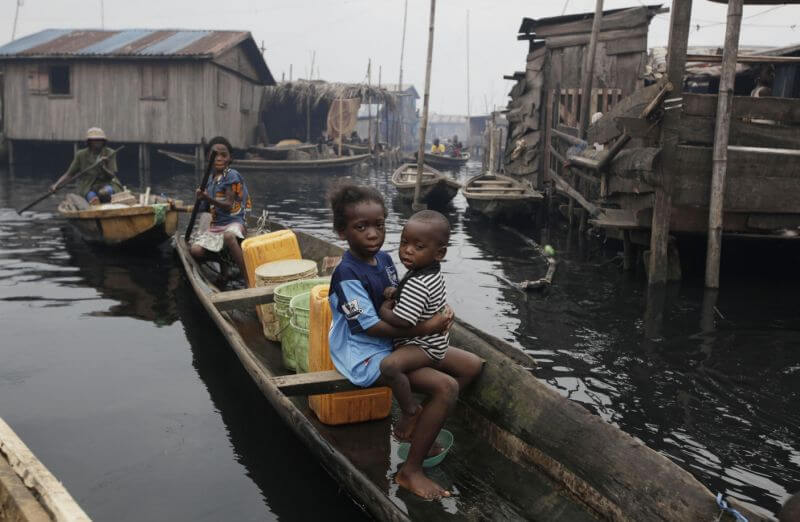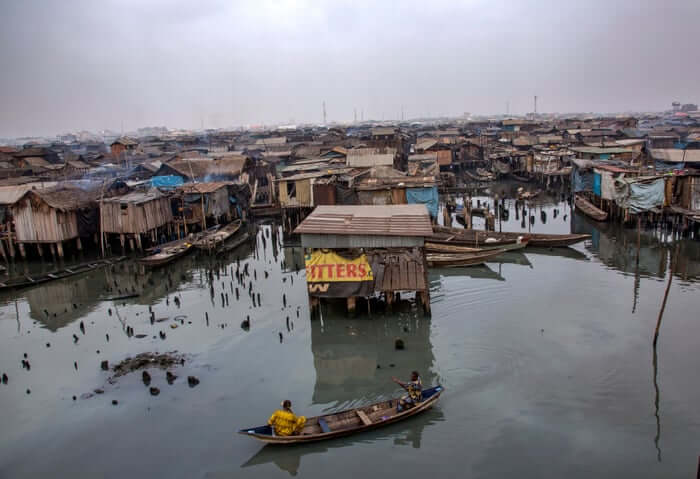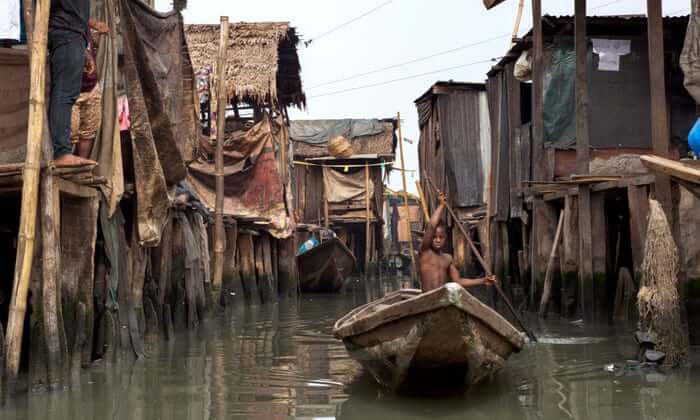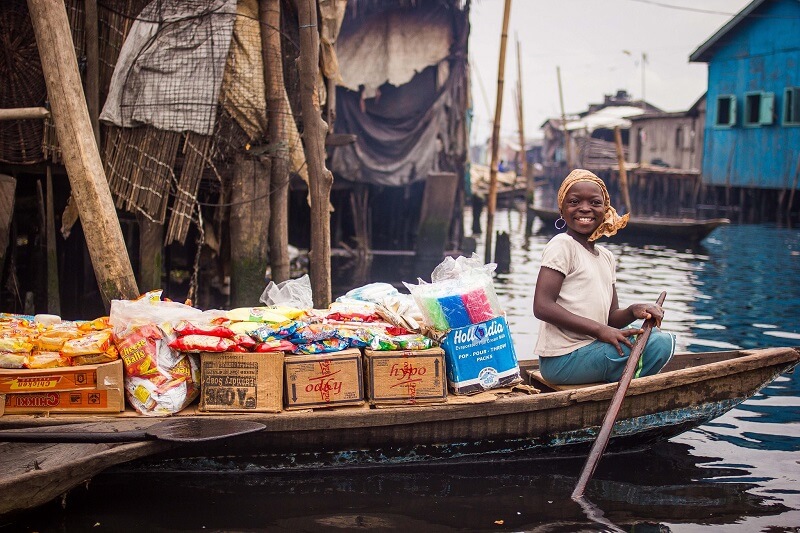“There is hardly anything you people enjoy that we don’t enjoy here. As far as we are concerned, there is nothing wrong with using this water, except that we don’t drink it. When it rains, we always dive into it to swim. It is in this water that we all learnt how to swim and to do other things.
“The youngest child in this community knows how to swim very well because we all acquire the skills naturally in this water. The smell from the water is not a strange thing to us. We are used to it but it may be offensive to you because you are a visitor. If you stay here for a month, you would not perceive any smell from the water anymore,” said Metuvoyi Ajayi, a resident of Ago Egun community in Makoko water front, Yaba local government area of Lagos state.
Advertisement
“We don’t have toilet. We ‘shit’ on a covered stilt and it goes directly to the water and inside this black, dirty water, our children swim, play and have fun. This is our community and it is part of our lives now.”

These were the words of Senami Wayile, 37, food vendor, mother of three and resident of Ago Egun water community, Makoko.
Metovuyi said, despite the living condition of the Egun people, “We are happy and wouldn’t relocate for any reason.”
Advertisement
The micro-organisms that cause infections are mostly found in the excreta of infected people or animal and surface water becomes contaminated with them from source such as direct defecation into water bodies.
The disposal of untreated human wastes into water along the waterfront communities is viewed from the public health aspect as hazardous.
Coastal and waterfront communities are faced with wide range of problems associated by their location and environment.Mc Garry, 1977; Ekugo, 1998,
Health experts say this sort of environment predisposes coastal communities to fecal- oral infections transmitted by the consumption of contaminated food and water.
Fecal- oral transmission occurs when an infectious agent in the fecal material from an infected individual is ingested by a second individual.
Advertisement
In a recent trip by our correspondent on a rainy Monday morning to Ago Egun community, it revealed that the slum, which has always existed, remains an eyesore as the unhygienic condition of the dwellers leaves much to be desired.
This condition is generally regarded as a major health hazard and in particular encourages the spread of infectious diseases such as typhoid, diarrhoea, malaria amongst others.
Speaking to another Ago Egun resident, Mrs Caroline Wayile, she said she almost lost her child to typhoid fever. “Whenever anyone falls sick in the community, we go to the hospital outside the canal to access treatment and that is applicable to pregnant women.”
According to Wayile, “when these women fall into labour, we use speed boat to take them to the hospital outside our community to deliver their babies because we don’t have a health centre.”
Access to portable drinking water, she said, “we sometimes go outside the community where we buy bags of pure (sachet) water. Sometimes, we use our boat, peddle down close to the Third Mainland Bridge where we get clean water to use.”
Wayile said most residents of Makoko water front hail from Badagry local government area of the state and has since made the slum their home despite its lack of basic amenities.
Advertisement
The rivers, lakes, lagoons and bays over which communities like Ago Egun are built are often the people’s source of food and water for drinking, domestic use and personal cleaning.
In such communities with unsanitary means of waste disposal and constant contact with polluted environment, sanitation becomes a major concern.
With health indices at its lowest ebb in Nigeria, Makoko is not immune from the alarming number of children who occasionally suffer from diarrhoea, typhoid and malaria as there are no presence of government health centres greatly contributing to the number of children under five dying from these diseases.
Irrespective of the various health hazards starring the Egun people in the face, the residents remain unruffled. Rather, they see life in the putrid environment as better than living on main land.
These dwellers who live in shacks built on stilts along the waterfront have continued the fight for survival on a sea of filth, living, fishing and procreating in the community famous for its increasing environmental deterioration.
Amid the piles of faeces, waste and garbage floating outside on the water, children are seen playing in the rickety and abandoned boats under the rain, swimming and having fun on the stinking lagoon. To them, there is no cause for alarm as it is the lifestyle of the Eguns.

Open defecation among the Egun people is seen as a norm. The stilts built for defecation ‘shit’ is nothing but an eyesore, irritatingly, these feacal matters are seen on the open bodies of the water and adds to the floating debris where the fisher men carry out their trade.
While Nigeria targets 2025 to be Open Defecation Free, it is important that it put into cognizance communities like Makoko water front in its projection to build two million toilets yearly.
For the water community, there is no cite of a good toilet typical for the environment and the stilts which serves as toilets are built right on the lagoon.
It is important that the proper collection, transportation, treatment and disposal of human excreta are crucial in the protection of the community health and the improvement of their environment.
Makoko water front is spread out beneath the most travelled bridge in west Africa’s largest city, third mainland bridge, Lagos State largely harboured by the Egun people who migrated from Badagry and Republic of Benin and whose main occupation revolves around fishing in a slum that keeps growing bigger and dirtier.
Inhabitants of the community, mostly women sells food, beverages and consumables, paddle their canoes using the ‘paths’ along the waterways during the day, while their men go fishing in the high seas in the middle of the night.
Makoko water front community are the major suppliers of dried and fresh fish in Lagos while their women sell in almost all parts of the state.
To get the views of the Baale of Ago Egun, Chief Emmanuel Shemede, our correspondent boarded another boat to his residence, the Chief who spoke through his son, Taiwo Shemede, also revealed that “living on water is part of our culture and we would give anything to remain on the lagoon rather than relocate to the mainland.”
Despite health hazards posed to the children especially in the community like typhoid, diarrhoea and malaria which occurs mostly November, December and January yearly, Taiwo said, Egun people remains adamant to relocate.
The yearly outbreak of these diseases explains the fact that there are no good source of water as the Egun people fetch water from the other side of the lagoon, where the water is ‘clean’ to drink and cook.
Health experts say polluted water contains micro-organisms which are harmful to health and causes cholera, diarrhoea, typhoid fever and other diseases.
Proper sanitation promotes health, improves the quality of the environment and thus, the quality of life in a community.
In developing countries, improvements in practice of disposing of human excreta and other wastes management techniques are crucial to raising levels of public health.
However an increasing amount of health associated problems results from lack of sanitation facilities, especially among the rural and the poor who live in overcrowded informal settlements
The deplorable state of the community, exposes children to serious health dangers as some of the shanties visited had bags of sachet water while others don’t, hence making Ago Egun community vulnerable to any disease outbreak.
Just recently in June this year, the Lagos state raised an alarm of an outbreak of Wild polio virus in three canals; Makoko, Itire and Maracana.
During the press briefing, the Permanent Secretary, Lagos state Ministry of Health, Titilayo Goncalves, disclosed that Nigeria has made remarkable progress in the fight against polio and are now 32 months without a wild polio virus.
“Not until the virus was detected in three canals in Lagos state; Makoko, Itire and Maracana. So far this year, seven viruses have been isolated in Lagos,” Gonclaves stated.
For a community like Makoko water front, an environment and public health expert, Dr. Oladapo Okareh, Head of Department, Environmental Health Sciences, Faculty of Public Health, College of Medicine, University of Ibadan, Oyo State, says it has both health and social impact.
The academic said, open defecation is a menace especially in Nigeria with the South West not left out as the practice is commonly called ‘short put’ in the region.
In an area ravaged with feacal matters, garbage and filths on the water bodies, the dwellers are either being associated with bacteria, protozoa, hermit which are pathogenic in nature as exposure bring one form of disease condition or the other
“Some of these diseases are related to pathogens, which are transferable infectious diseases like diarrhoea, typhoid, cholera and viral infections.
“For the children swimming in the dirty water full of human feacal matter in Makoko, he said, are exposed to schistosomiasis which is gotten through snail popularly called snail fever.
“Even before the feacal matters get into the mouth of these individuals who are exposed either through swimming, there are feacal matters that are already infected with one bio agent or the other. When exposed to these bio agent, it becomes a problem.
“Also, he pointed out that, the feaces of a young child is more toxic, dangerous than that of an adult. That is so because of their digestibility. Most of these food related materials are not easily digested. That is why we have children food and adult food,” Dr. Okareh explained.
The environmentalist pointed that the Egun community is associated with feacal related skin diseases, “in a population, you can take a diagnosis to see the disease pattern and deduce that the people may be having problem with water shortage, water and feacal related diseases and most of these are just environmental related diseases.”
The vulnerable group especially women, pregnant women and children are the most affected in such an environment as they are the first point of disease outbreak.
Dr. Okareh pointed that some of the health related diseases faced by human are either water or feacal related, noting that animal waste are often down played as they also defecate openly posing its own health related challenges.
He suggested that the best way to control these diseases are sanitation education, proper sanitation, as well as providing adequate toilet facilities.
Explaining further the health dangers of open defecation, Professor Godson Roland Ana, Environmental Health Sciences, Faculty of Public Health, College of Medicine, University of Ibadan, Oyo State said, defecating in the open whether the receiving medium is the soil or water, is unhealthy and affects the quality of the environment.
The environmentalist said an exposed environment such as Ago Egun, humans interface with these water and soil and out rightly, “I will say it’s a nuisance and beyond the nuisance effect, there are pathological consequences on the population within that environment. There could be concerns for Gastrointestinal infections (GIT) related infections and parasitic infections.”
Gastrointestinal infections are viral, bacterial or parasitic infections that cause gastroenteritis, an inflammation of the gastrointestinal tract involving both the stomach and the small intestine which symptoms include; diarrhea, vomiting, and abdominal pain.
A Community like Makoko faces environmental threat as the water bodies is highly contaminated with a number of microbial bacteria especially, parasite from feacal origin.
He said for water front communities, the water bodies might be the only water source meant for domestic use but grossly polluted posing health challenges such as gastrointestinal infections related or skin related infections.
The Way Out
Professor Ana suggested that for such a water community without toilet, “just like it’s done in most Niger Delta communities, erect platforms where the toilet system that will not give way for the feaces to get into the water bodies. Also build some toilets outside the canal to avoid people defecating into the water.”
Ending open defecation 2025, he advised that massive awareness on the issue is paramount as well as increase in campaign to enlighten people both by the government, private sector and concerned organizations.
The academic don urged Nigerians be involved in this massive awareness campaign to draw the attention of the public to the effect of defecating in the open.
The legislatures should institutionalise provisions of toilets in public places just like in most developed countries such that for every short distance, a toilet is available for use as well as ensure that states and local government makes such provisions for the people.
Thirdly, Prof. Ana said, the government and related organization should enforce that the public uses these toilets facilities or face penalties, adding that, in the absence of provisions, enforcement becomes difficult.
According to the United Nations Children’s Fund, (UNICEF) Water and Sanitation, Specialist, Mr. Bioye Ogunjobi, during a two-day Media Dialogue on Clean Nigeria: Use The Toilet Campaign supported by the European Union and UKAid, said Nigeria needs not less than two million toilets annually between 2019 and 2025 to achieve the target of universal poor sanitation.
Nigeria’s current delivery of improved toilet is approximately 160,000 per year, stating that poor hygiene and water are responsible for the frequent episodes of diarrhoea and other water related diseases.
Ogunjobi said over 100,000 children under age five die yearly due to diarrhoea of which 90 percent is directly attributed to unsafe water and sanitation.
The practice of open defecation has an economic, social and health impact on National development as Nigeria loses about N1.3 percent (N455 billion) of her GDP annually to poor sanitation and a third of that cost is as a result of open defecation.
According to the WASH NORM report, one in four Nigerians defecates in the open, while one in two persons in the North Central defecates in the open. Out of the 47 million practising Open Defecation in Nigeria, 16 million are from the North Central.
According to the Acting Coordinator, Use the Toilet Campaign, Federal Ministry of Water Resources Abuja, Mrs. Chizoma Opara, Nigeria is ranked second globally among 10 countries with the highest number of open defecation since 2015.
Opara said to get Nigeria out of the situation, the country under the campaign has established a National Road Map to end open defecation by 2025, stating that, “already, Nigeria is studying the strategy being implemented by India to get over 550 million of her population out of open defecation”
The campaign acting coordinator disclosed that only 13 local governments out of the 774 local governments in Nigeria have been free from open defecation.
Opara added that the campaign team and other partners have concluded arrangements to scale up the programme.
On the fees being charged on public toilets, she said “for the toilets to be functional a stipend must be attached to it to sustain it as well as pay those maintaining and running the place.
“We are looking at a Public-Private Partnership arrangement to provide toilets across the communities. We have started discussing with some private organizations on how they can take up WASH as social cooperate responsibility. We are also building a business around toilets.”
Health experts are of the view that without making access to toilets in public places including markets, motor parks and highways, as well as creating awareness to change the behaviour of the people, the dream of the country to be open defecation free may be a mere dream.
As analysts opined that, while the government builds toilet in all designated spots, there should be strict enforcement on usage of these facilities as defaulters should be penalized.




